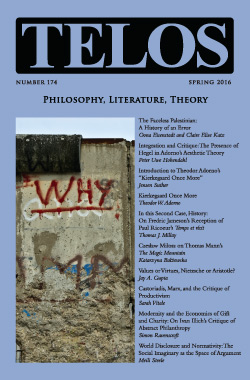This essay explores the theological and philosophical underpinnings of the work of the radical Catholic social theorist Ivan Illich (1926–2002), via a discussion of the changing meaning of charity in Western thought and practice. It is argued that Illich’s thought is animated by a traditional theological understanding of charity as anchored in local, personal bonds and networks of reciprocity, and that his critique of Western economic modernity has much to do with the gradual depersonalization and institutionalization of charity, theoretically and in society, linked to its transmogrification into “abstract” philanthropy. Drawing on debates around the nature of love and the gift in contemporary theology, philosophy, and social anthropology, the conceptual dynamics of Illich’s account of human sociality are made clear.
|
Telos 174 (Spring 2016): Philosophy, Literature, Theory is now available for purchase in our store. |
||||
|
Telos Press Publishing · PO Box 811 · Candor, NY 13743 · Phone: 212-228-6479 Privacy Policy · Data Protection Copyright © 2025 Telos Press Publishing · All Rights Reserved |
||||



